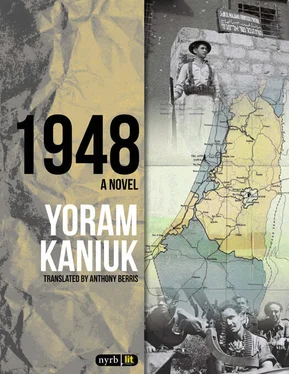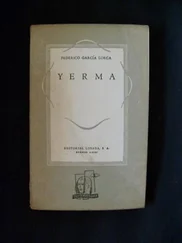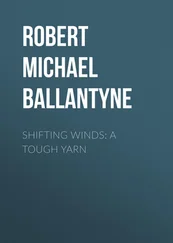We calibrated the weapons according to the orders of someone they said was an officer and looked like a youth a bit older than me, and took them outside. It was a rainy day, from the citrus groves came a pleasing fragrance, and in the rain we heard the faint sound of weeping, and some princess in short pants walked by and said, So, you’re the great fighters, who are you to be fighters, who do you think you are, and we didn’t know what she was saying because she didn’t use question marks or exclamation marks. In those days question marks were a sign of intelligence. The newspaper headlines didn’t provide news but asked questions, “Will War Break Out?” “Will America Support Us?” And she said, You’re all your mothers’ sweeties, a terrible war is starting, and you’re not prepared, and so — and this is an order — you’re going to the blue building by the lemon trees and each of you will be issued a rifle, an ammunition pouch, and you don’t play around with your weapons, and you’ll go to sleep like mama’s boys, and you’ll be shipped out the day after tomorrow.
In the morning I noticed that Ari-nom-de-plume had disappeared. I’d already learned not to ask about what he was up to. I got up to go to an old building where somebody from the course was making omelets and brewing coffee, I think he was from the senior intake at Sdot Yam, the one from which not one member would be alive a couple of months later, including that one of blessed memory, whose name was perhaps Naftuli. In my coat pocket I found a note, “Don’t Worry. Don’t ask. I’ll be back. Not a word about me, Ari.”
We got together in the evening, and a new guy appeared who said he’s our battalion commander, and it’s the Fourth Battalion, and we are part of it because the Palyam has been part of this battalion for a long time, and it’s a renowned battalion. I didn’t know what it was renowned for. The guy spoke about war and attrition and killing and retaliation and the purity of arms and how he’d castrated an Arab by the River Jordan, and young people who’d already been killed on the road to Jerusalem, and that is where — and this is how he said it — we are bound.
I couldn’t sleep that night. Ari-nom-de-plume hadn’t come back to protect me. I was a kid. Suddenly I was disassembling rifles and counting bullets and cleaning mirrors and muzzles, and I missed my bed at home, which was a fifteen-minute walk from Sarona. I looked out the window at the lights of Tel Aviv and Ari-nom-de-plume suddenly materialized out of nowhere. It was the teacher Blich who’d taught me maftzia , the high-register Hebrew for “materialized.” He gave me a “satisfactory” in composition, and my mother, who taught at the same school, told me to embellish a bit, and I learned words from the dictionary. With the maftzia he gave me a “very good.” And Ari-nom-de-plume maftzia and says, Yalla , I’m here. I was glad, because he’d interpret those moments for me when I didn’t know who I am and what I’m doing in this grown-up place where they talk about shooting and death and warfare.
We went together to an empty green building where we were to meet before our departure. There was British army office furniture in it. Ari-nom-de-plume took a wad of bills from his pocket and said, I’ve made some money. I asked him how. He said, It’s for both of us. I said, Ari, I’ve told you a thousand times, don’t make money for me. Make it for yourself. He laughed and then turned serious and almost whispering he said, You’re spoiled. You’ve been given everything. Your father with his Beethoven and the museum and all the records and you with your Shlonsky and Tchernichovsky and all that, and your teacher mother, afternoon coffee, I grew up in the gutter, and I know how to sniff things out, and I laugh at someone like you, but you know, when I first met you I hated you because you were a goody-goody from Tel Aviv but I won’t forget you in the boat that capsized, with your Youth Encyclopedia , and how frightened you were but brave as well. It hurt you to see the Arabs fleeing from Caesarea. Look, listen to me, nothing will come of you. You’re not hungry enough to live in this world. I used to drive down Allenby Street at night in my father’s cart and he’d steal piping from the new houses that were going up, and I stole bottles of eau de cologne from locked shops and sold them to the whores at Bereleh’s on Chelouche Street, and you, what have you done? Beethoven.
He got up, lit cigarettes for both us, and told me that the Primus pilots go to the exhibition grounds in north Tel Aviv, by the place we’d reached in the boat, not far from the Yarkon estuary. They get bombs for their planes from a Mr. Wilenchuk, and they beg for more but he hasn’t got enough. Ari-nom-de-plume said, I followed this Wilenchuk, a nice man who crossed the Yarkon and there, in a deserted Arab mud hut, I saw him supervising the manufacture of the bombs. I hid in the trees and yelled, Air raid! Air raid! And there really was a raid right then, as if God was working for bastards like me and not for Beethovens like you, and that raid wasn’t far away, in Hawaii Park, and a few guys got killed. Everybody in that little factory are workers, they’re not in the Haganah, ordinary people who come to work, and they threw themselves onto the bombs to protect them, not themselves, only the bombs. I sneaked inside and borrowed ten bombs that Wilenchuk was about to hand over to the pilots.
I drove to the woods on the Yarkon where I used to fuck a girl called Heshkovitz, and I went to the poor pilots who were crying out for bombs but there weren’t enough, and I said, I’ll sell you these at five hundred mils each, and they got excited and hugged me and bought the bombs and flew off in their comical Primuses, and I stashed the money in my hiding place in the Shapira neighborhood that’s not far from here. And now what? We’re off to war? I heard there’s a lot of money in the Arab villages. Gold. The Arabs hide gold in clay jaras . There’ll be no more Caesarea with that moron of an officer. Arabs don’t believe in banks. All their money and gold is in jaras with snakes, to scare off guys like me who aren’t scared of anything.
As Ari-nom-de-plume was speaking the question-mark-less woman came along and gave out postcards and pencils, and everyone was told to write a card to his family. She said you can write anything except where you’ve been and where you are now. Ten minutes later she collected the cards and with a marker pen censored words she thought were dangerous. She found a few words to censor in my card too. In the end it looked like this: Shalom Mom, Dad, and Mira,… We’re going … see the … We’ll meet again when … I miss you … Regards to Amikam … Yours, Yoram. That was the only card my parents received from me until I came home for that one day in the middle of the war, when the two guys were shot inside the armored vehicle and we took Abba Eban to Tel Aviv.
The next day we were crowded onto trucks. Ari-nom-de-plume bought the seat next to the driver for twenty grush*. The officer came along to sit in the cab because he was in command, but Ari-nom-de-plume said he was already sitting there, and the officer got mad, and we could hear their raised voices, and another officer standing there said that this is the Palmach and there aren’t any privileges, and the first officer said, But this shit bought the seat and that isn’t exactly the Palmach either, and the driver said, What’s the matter with you, I’m not in the Palmach, I’m from the Histadrut.
We drove along a dirt road, and were thrown from side to side and fell all over one another. One guy spat, the guy who caught the spit hit the spitter, others sang “She’ll be wearing no pajamas,” and at the end of the road, tired, looking like cadavers — except for Ari-nom-de-plume who got down from the cab as fresh as a daisy and as happy as a clam — we went into a kibbutz they said was Kibbutz Hulda. We lay down somehow, I don’t remember where, it was raining lightly, and we cleaned our weapons. We were given bread and sardines and tomatoes and heard firing. We realized that the guys who’d left before us were in a battle not far away. We were told to come, go figure where to today, there was a wood and a hill with maybe a gravestone on it and a cypress that stuck in my memory, such a beautiful, noble cypress, it swept sharply into the sky that seemed low because of the mist. We got up and ran to the hill, we lay on top of dead bodies there. We heard more firing. There was no officer with us. Ari-nom-de-plume took charge and yelled at us to move this way and that, and we saw hundreds of Arabs streaming toward us, running and shooting and shouting, and Ari-nom-de-plume said that our planning and theirs is piss-poor because nobody knows what to do.
Читать дальше












